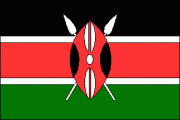Mr. Chairman, Excellencies, Ladies and Gentlemen,
Let me start by congratulating you, Mr Chairman and members of the Bureau on your election.
I assure you of the support and cooperation of Kenya and look forward to fruitful deliberations under your leadership.
We welcome the briefing delivered by Ms. Izumi Nakamitsu, the High Representative for Disarmament Affairs during the opening session.
Kenya aligns itself with the statements delivered by the representative of Venezuela and Morocco on behalf of the Non-Aligned Movement (NAM) and the African Group respectively.
Mr. Chairman,
My delegation reaffirms Kenya’s longstanding commitment to nuclear disarmament, non-proliferation, and a world free of nuclear weapons. Kenya signed the Pelindaba Treaty declaring Africa a nuclear weapons free zone in 1996 and ratified it in 2001.
Kenya has remained unwavering in calling for banning of nuclear weapons. The country voted for the adoption of the Treaty on the Prohibition of Nuclear Weapons, which was adopted in July 2017 here in New York. The treaty is a critical milestone in achieving a nuclear-free world.
This is why its full implementation and that of other international conventions and treaties banning nuclear weapons and other weapons of mass destruction must remain a priority for Member States.
Mr. Chairman,
Kenya supports the peaceful research and development of nuclear energy for peaceful purposes in accordance with Nuclear Non-Proliferation Treaty (NPT) which Kenya has been a party since 1970. We believe that this pursuit of developing nuclear energy should be within the framework and protocols of the International Atomic Energy Agency (IAEA).
As provided in Article 6 of the NPT, all countries should promote and cooperate in the peaceful exploitation of nuclear energy, while at the same time working towards complete nuclear disarmament.
Mr. Chairman,
Kenya is a party to the Comprehensive Nuclear Test Ban Treaty (CTBT) of 1996 which calls for banning of nuclear weapons testing. We call on all the remaining countries to make the CTBT a reality by ensuring its entry-into force. In order to achieve this, we, Member States, must relentlessly work at having the political will to build trust at the regional and international levels.
On September 6th Kenya was honored to participate, here in New York, in the High-Level Meeting to commemorate and promote the Ninth Observance of the International Day Against Nuclear Tests. This is a an important annual meeting to honor and pay tribute to the victims of nuclear tests, and to stand in solidarity to remind ourselves of the long-term suffering and continued threat that nuclear tests pose to humanity, international stability and security. My delegation thanks Kazakhstan for this initiative (2009).
Mr. Chairman,
My delegation greatly values the immense contribution and important work of the Conference on Disarmament, and that of the Disarmament Commission. Kenya strongly believes that disarmament can have a significant positive impact on development. Resources saved during the disarmament process should be strategically and effectively integrated into nationally-owned and nationally-driven programmes that enhance socio-economic development and foster governance structures including those contained in the UN 2030 and AU 2063 Agendas.
Mr. Chairman,
I will now focus on the issue of Small Arms and Light Weapons (SALW). The illicit transfer and trade in Small Arms and Light Weapons is a serious threat to international peace and security. Kenya has taken important measures to implement the UN Programme of Action on SALW. These include strengthening the policy and legislative frameworks to address loopholes in law to ensure proper national stockpile management of small arms and light weapons.
The effects of widespread availability of small arms and their misuse, have historically contributed to many conflicts especially in our part of the world. Consequently, this has resulted in displacement of millions of people from their homes as refugees or as internally displaced persons. Terrorism, wildlife poaching, piracy, cattle rustling and other serious criminal activities that threaten international peace and security are also consequences of proliferation of small arms, including their easy availability.
Mr. Chairman,
We note, with concern, that for the first time, we lacked consensus during the 18-29 June, 2018 Review Conference of the UN Programme of Action (UNPoA) on Small Arms and Light Weapons deliberations. It is critical to have a follow-up mechanism or broader informal discussion forums on these contentious issues in order to avoid the need for a vote. We need to prioritize on areas of convergence so that we can fulfill our agreed objective on preventing, combating and eradicating the illicit trade in Small Arms and Light Weapons in all its aspects.
Mr. Chairman,
We further note that the last round of deliberations by the Group of Governmental Experts (GGE) on Information Security (2016/2017) failed to arrive at a consensus outcome report. Again, the issue of addressing the existing and potential threats posed by the use and misuse of information, communication and technology, should be one where our viewpoints should be converging rather than diverging. This will ensure progress on crucial issues through joint conclusions and implementation. Where necessary, research and data can be appropriated for guiding policies, laws and for training and other capacity-strengthening initiatives at the national level.
In conclusion, Kenya looks forward to engaging further and more comprehensively on important issues during the thematic debates.
I thank you.


